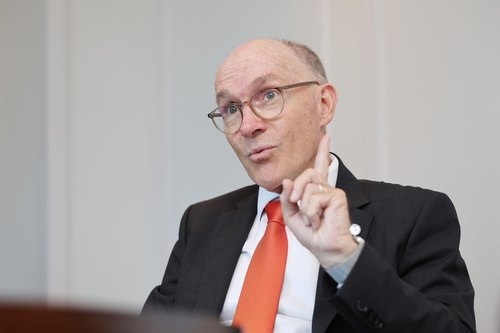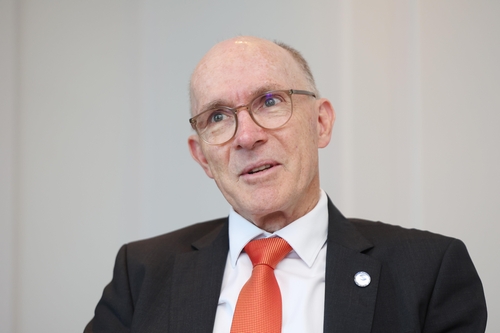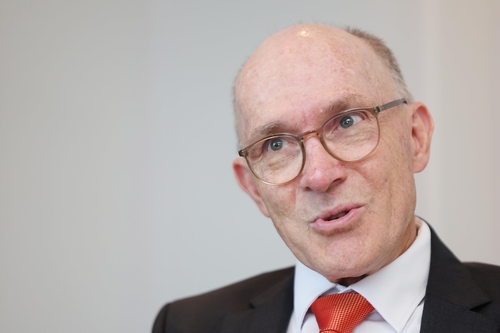- California Assembly OKs highest minimum wage in nation
- S. Korea unveils first graphic cigarette warnings
- US joins with South Korea, Japan in bid to deter North Korea
- LPGA golfer Chun In-gee finally back in action
- S. Korea won’t be top seed in final World Cup qualification round
- US men’s soccer misses 2nd straight Olympics
- US back on track in qualifying with 4-0 win over Guatemala
- High-intensity workout injuries spawn cottage industry
- CDC expands range of Zika mosquitoes into parts of Northeast
- Who knew? ‘The Walking Dead’ is helping families connect
(Yonhap Interview) CTBTO chief urges N. Korea to take ‘small step’ in nuclear test moratorium
The head of the international body tasked with overseeing a global ban on nuclear tests said Wednesday that he hopes to see North Korea take a “small step” in committing not to proceed with what would be its seventh nuclear test.
In an exclusive interview with Yonhap News Agency in Seoul, Robert Floyd, executive secretary of the Comprehensive Nuclear-Test-Ban Treaty Organization (CTBTO), said he hopes to see “North Korea take a small step towards building some bridges of trust and confidence with other countries.”
Based in Vienna, Austria, the CTBTO is a global organization tasked with building up the verification regime of the Comprehensive Nuclear-Test-Ban Treaty (CTBT).
“It would be a helpful first step, and on that, hopefully, we could see discussions and negotiations and some level of peace and security that could actually be built upon that,” Floyd said.

Pyongyang is widely believed to have been preparing to conduct what would be its seventh nuclear test, as the regime focuses on increasing the quantity of its nuclear forces and advancing related technologies.
The North conducted its sixth and last nuclear test in September 2017.
Floyd, who visited South Korea for the first time in his capacity as CTBTO executive secretary, added that he wishes to “engage with the leadership” in the North for talks on potential suspensions of nuclear tests.
“My desire is to have a conversation with them. And I would not want to prejudge anything, but to have that conversation would be a wonderful thing,” he said.
Floyd, who previously worked as the director general of the Australian Safeguards and Non-proliferation Office before joining the CTBTO in 2021 as its chief, stressed that South Korea has been “involved in technical exchange and interaction with our organization to see the improvement of the international monitoring system and the international data center.”
The CTBTO’s global network comprises 321 monitoring stations across the world, detecting seismic vibrations and sounds in both the atmosphere and ocean, as well as radioactive isotopes to detect nuclear tests across the world.
The organization has a monitoring station in Wonju, 87 kilometers southeast of Seoul.
Floyd expressed confidence in the CTBTO’s capacity to pick up “every seismic activity” that takes place in North Korea, saying that its system detects “even small events, such as the crumbling of the tunnels inside the Punggye-ri test site,” despite not having any measuring equipment inside the North.

When asked about North Korea’s evolving ballistic missile technology and its implications for the country’s nuclear warhead delivery capabilities, Floyd made clear that ballistic missile development “was not our focus.”
He stressed his organization’s focus was to “detect any country anywhere in the world that might test a nuclear device and conduct a nuclear explosion.”
The CTBTO chief also highlighted that the organization provides “objective, independent information” related to nuclear testing to all 186 signatories to the CTBT.
North Korea, India and Pakistan are the only countries among the organization’s Annex-2 nations that haven’t signed the treaty.
The United States, China, Israel, Iran and Egypt have signed it but have yet to ratify it.
According to a CTBTO official, more than 2,000 nuclear tests were conducted in over 60 locations between 1945 and 1996, when the CTBT was adopted for signing.
Since 1996, there have been fewer than 12 tests, of which North Korea conducted six, all since 2000, the official added.
“That to me is success. And the reason it’s successful is because the international monitoring system, that verification mechanism, is already set up and already working,” Floyd said.
On the issue of ratification of the CTBT by the U.S. and China, Floyd noted that their “decision to ratify is bound in various geo-strategic considerations.”
“I would certainly welcome any initiative which would see great statesman-like leadership being displayed by China and the United States of America to move forward on a treaty such as this.”

On the growing public debate in the South over whether Seoul should acquire its own nuclear weapons, Floyd said he was “encouraged” that the government has “stood rock solid firm in its position to support a strong global architecture for nonproliferation and, ultimately, disarmament of nuclear weapons.”
“I’m particularly proud of the strength, the courage and the leadership of the government of the Republic of Korea to stand firm with the vast majority of the states in the world on these important issues.”
Floyd also stressed that the CTBTO has had strong ties with South Korea over the years, noting Seoul signed the CTBT on the first day it was opened for signature in 1996.
“That is a significant sign of the commitment of your country, and we have seen nothing less than that strong commitment (from South Korea) towards this treaty,” he said.











